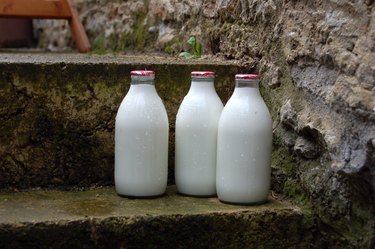
You probably were told your entire childhood that you need to drink milk to grow big and strong. While milk does have great benefits like being a rich source of calcium, potassium and high-quality protein, all essential for healthy bodies, drinking too much milk may result in side effects.
Tip
As always, things should be consumed in moderation, including milk. Containing three times the amount of protein as human milk and many hormones, cow's milk is not technically designed for human consumption, which can sometimes lead to metabolic disturbances, acne and other diseases.
Video of the Day
Benefits of Milk
Milk contains nine essential nutrients, which makes it one of the most nutrient-rich beverages you can consume. According to Megan Ware, RDN, LD, founder of Nutrition Awareness, milk is good for your bones because it's rich in calcium, an essential mineral for healthy bones and teeth. Cow milk is also fortified with Vitamin D, and the combination of both helps prevent against osteoporosis.
Video of the Day
Cows milk is also a rich source of potassium and high-quality protein. Potassium has the ability to widen blood vessels and reduce blood pressure. Increasing your potassium intake and reducing your sodium intake can end up reducing the risk of cardiovascular health. Containing all essential amino acids, milk is also a rich source of energy that comes in the form of saturated fat, which can prevent muscle mass from being used as a source for energy.
According to The National Dairy Council, just one 8-ounce serving of milk delivers a unique nutrient package that puts you well on your way for meeting the Daily Value for calcium, riboflavin and other key nutrients (based on a 2,000 calorie diet).
Read More: Health Benefits of Drinking Warm Milk
Drinking Too Much Milk: Cons
Dairy consumption is controversial, and for every study that shows the disadvantages of drinking milk, there's one that proves the benefit. According to Deepa Verma, MD, founder of Synergistiq Integrative Health, cow's milk contains on average about three times the amount of protein of human milk, which can create metabolic disturbances in humans. Milk and dairy products are also pro-inflammatory and mucus producing, which increases risks in respiratory conditions and allergies.
Foods coming from animals naturally contain hormones, but cow's milk specifically contains high amounts. Most dairy cattle are injected with a cocktail of hormones which stimulates rapid growth of cattle and artificially speeds up milk production. One of these hormones, IGF-1, boosts the division and multiplication of all normal and abnormal cells, and has been linked to various cancers and acne. Proteins, sugars, fat and saturated fat in milk and dairy products may have health risks for children such as obesity and diabetes.
Read More: What Are Some Disadvantages of Dairy Milk?
Going Dairy-Free
Like all things, drinking too much milk may not be safe, and should only be consumed in moderation. Whether you're intolerant or decide to be dairy free, there are other protein and calcium rich alternatives. A non-dairy substitute like unsweetened soy milk provides 7 grams of protein, 1.5 grams of dietary fiber, 368 mg of calcium and 225 mg of potassium.
Another healthy dairy-free option is coconut milk. One cup has 4.6 grams of protein, 497 mg of potassium and 6.4 grams of carbohydrates. Modern medical science is now confirming the use of coconut may provide a range of health benefits including killing viruses and bacteria, boosting energy and improving digestion.
- National Dairy Council: Three Servings of Milk Deliver a Unique Nutrient Package
- Pros & Cons: Is Drinking Milk Healthy for Humans?
- American Cancer Society: Recombinant Bovine Growth Hormone
- Soyfoods Association of America: Soy Fact Sheets
- Physicians Committee For Responsible Medicine: Dairy Linked to Lung, Breast, and Ovarian Cancers
- Coconut Research Center: Home
- ProCon: Deepa Verma, MD Biography